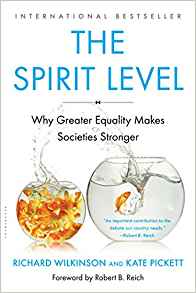 Given all the controversy around inequality, this is a must read book.
Given all the controversy around inequality, this is a must read book.
About three-quarters of it is what I call “proving the obvious”–that inequality is, in fact, bad in every way imaginable.
Inequality correlates to almost every bad social metric you can imagine. Health, lifespan, performance, violence, happiness, and so on. The more unequal a society, holding other stuff even, the worse the society is to live in.
It really is that simple, and The Spirit Level goes to ludicrous lengths to provide the evidence, because in our society the ludicrously obvious is disputed by people with a lot of money.
But The Spirit Level also has some non-intuitive information to share, of which the most interesting to me was that high inequality is bad for the people at the top. People in, say, the top one percent in a more equal society are better off than those in the top one percent in a more unequal society–even though those in the latter would have more money.
You’d think having more money would mean that you “win,” but, in fact, your life span is shorter, you are more unhealthy, and you are more unhappy than those in the same relative position in a more equal society.
Another interesting fact is the performance effect of being unequal: Simply being told they are lesser destroys people’s performance. This is quite robust. You can test them, then tell them they’re unequal, test them again, and see it happen.
The causes of inequality’s other effects are hard to tease out, but the most likely reason is stress: Being unequal is stressful. It’s more stressful for people on the bottom, constantly worried and being ordered around, but it’s stressful even for those on top. The more unequal the society, the more people below you are stressed and angry and the more you have to do to defend your situation.
And, of course, unhappy people just aren’t nice to be around, and if your society systematically makes people less happy, that’s going to feed back into you, because you live in the society.
I really do think everyone should read this book. It’s not that it’s earth-shattering, it’s that it makes you one hundred percent confident that, yes, inequality is just bad, whether or not the people at the bottom have a TV.
The results of the work I do, like this article, are free, but food isn’t, so if you value my work, please DONATE or SUBSCRIBE.
